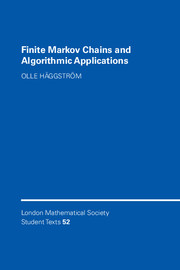Book contents
- Frontmatter
- Contents
- Preface
- 1 Basics of probability theory
- 2 Markov chains
- 3 Computer simulation of Markov chains
- 4 Irreducible and aperiodic Markov chains
- 5 Stationary distributions
- 6 Reversible Markov chains
- 7 Markov chain Monte Carlo
- 8 Fast convergence of MCMC algorithms
- 9 Approximate counting
- 10 The Propp–Wilson algorithm
- 11 Sandwiching
- 12 Propp–Wilson with read-once randomness
- 13 Simulated annealing
- 14 Further reading
- References
- Index
8 - Fast convergence of MCMC algorithms
Published online by Cambridge University Press: 29 March 2010
- Frontmatter
- Contents
- Preface
- 1 Basics of probability theory
- 2 Markov chains
- 3 Computer simulation of Markov chains
- 4 Irreducible and aperiodic Markov chains
- 5 Stationary distributions
- 6 Reversible Markov chains
- 7 Markov chain Monte Carlo
- 8 Fast convergence of MCMC algorithms
- 9 Approximate counting
- 10 The Propp–Wilson algorithm
- 11 Sandwiching
- 12 Propp–Wilson with read-once randomness
- 13 Simulated annealing
- 14 Further reading
- References
- Index
Summary
Although the MCMC approach to simulation, described in the previous chapter, is highly useful, let us note two drawbacks of the method:
(A) The main theoretical basis for the MCMC method is Theorem 5.2, which guarantees that the distribution μ(n) at time n of an irreducible and aperiodic Markov chain started in a fixed state converges to the stationary distribution π as n → ∞. But this does not imply that μ(n) ever becomes equal to π, only that it comes very close. As a matter of fact, in the vast majority of examples, we have μ(n) ≠ π for all n (see, e.g., Problem 2.3). Hence, no matter how large n is taken to be in the MCMC algorithm, there will still be some discrepancy between the distribution of the output and the desired distribution π.
(B) In order to make the error due to (A) small, we need to figure out how large n needs to be taken in order to make sure that the discrepancy between μ(n) and π (measured in the total variation distance dTV(μ(n), π)) is smaller than some given ε > 0. In many situations, it has turned out to be very difficult to obtain upper bounds on how large n needs to be taken, that are small enough to be of any practical use.
Problem (A) above is in itself not a particularly serious obstacle. In most situations, we can tolerate a small error in the distribution of the output, as long as we have an idea about how small it is.
- Type
- Chapter
- Information
- Finite Markov Chains and Algorithmic Applications , pp. 54 - 63Publisher: Cambridge University PressPrint publication year: 2002



